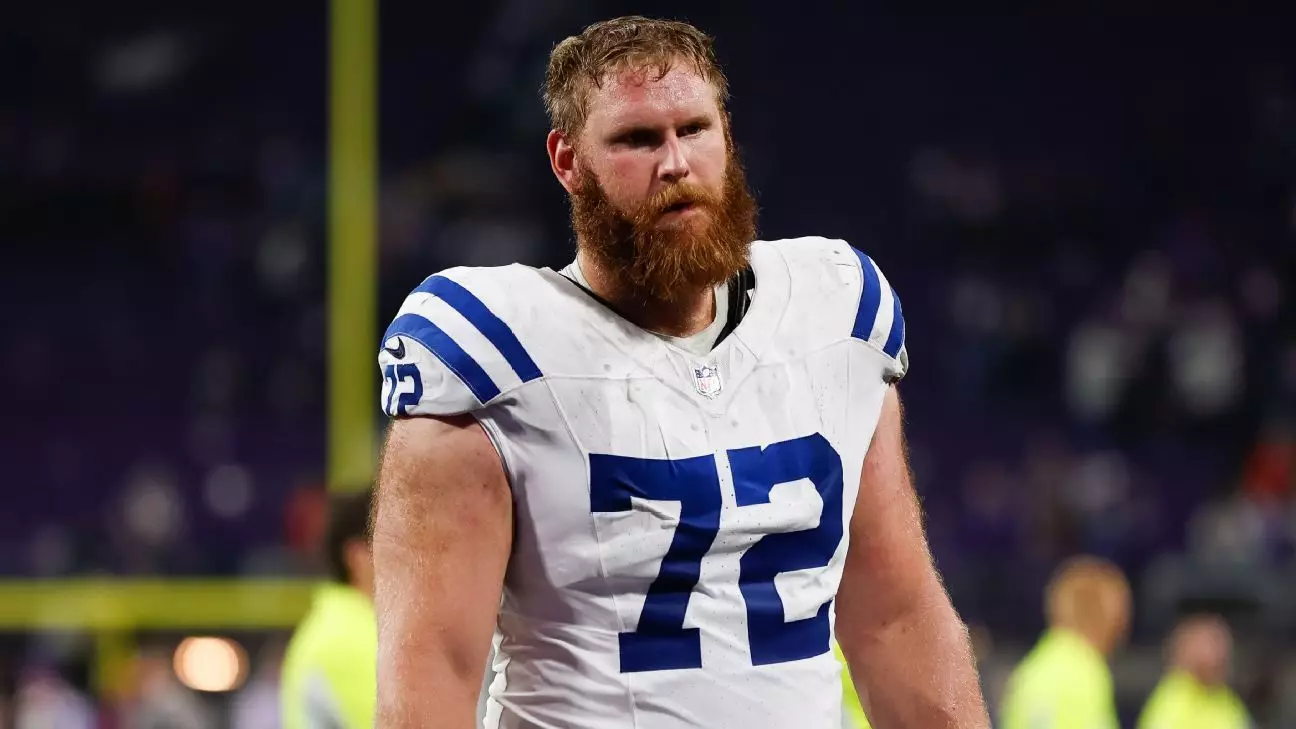In a striking confession, Indianapolis Colts offensive tackle Braden Smith courageously opened up about the harrowing mental health battle he faced last season. Although he physically occupied the field, he felt mentally absent, trapped in a debilitating cycle of obsessive-compulsive disorder (OCD). This revelation sheds light on an often stigmatized topic—mental health struggles among professional athletes—highlighting the profound impact it can have not just on performance, but on one’s entire being.
Smith’s ordeal culminated in a shocking contemplation of suicide—a stark reminder that the invisible battles many face can threaten their very existence. “I was a month away from putting a bullet through my brain,” he candidly confessed, highlighting the severity of his crisis. This stark reality serves as a wakeup call, amplifying the urgent need for more conversations around mental health in the sporting world.
The Heavy Burden of Religious Scrupulosity
Delving deeper into his affliction, Smith revealed he suffers from a type of OCD known as religious scrupulosity. Unlike general OCD, which may involve a wide array of compulsions and fears, religious scrupulosity is driven by obsessive concerns about offending a higher power or facing eternal repercussions. The International OCD Foundation explains this condition as a source of anxiety that perpetuates obsessive thoughts and behaviors, causing significant disruption to daily life.
“For someone trying to emulate perfection—the standard set by religious teachings—it’s incredibly overwhelming,” Smith shared. His desire to live up to a divine ideal added an extraordinary layer of pressure that ultimately became unmanageable. This radical pursuit of holiness became not a source of comfort, as one might expect, but rather a tormenting burden that consumed his life.
Seeking Help: Therapy and Psychedelics
Smith’s journey toward healing led him to seek therapy—a commendable step that many often overlook. It was during this time that he confided in his wife about his disheartened resolve to possibly retire if things did not improve. The struggle turned to desperation; after spending weeks in a mental health facility with little progress, he found himself searching for alternative solutions. This search culminated in his choice to explore ibogaine, a psychedelic that lacks legal status in the U.S. but has shown potential in academic studies exploring mental health treatment.
Choosing to travel to Mexico for such treatment may be criticized by some as a controversial path, yet for Smith, it was a beacon of hope. His account suggests a paradigm shift in how society perceives unconventional mental health treatments and raises essential questions about accessibility and regulation in the realm of mental health therapies.
A New Dawn: Reclaiming His Identity
Emerging from these dark waters, Smith’s transformation is nothing short of inspiring. He reported feeling revitalized, finally reclaiming the identity he thought he had lost. “I want to be me again here,” he stated, realizing the importance of his presence not just for himself, but also for his family and team. This new mindset reflects a healthier understanding of mental health, where acceptance and compassion for oneself reign supreme.
His journey has not only transformed his outlook on life but also altered how he engages with intrusive thoughts. “I don’t do compulsive prayers at all anymore,” Smith explained, embodying a newfound resilience that allows him to face negativity with simplicity and grace. Breaking free from the chains of compulsive behavior, he has turned his focus toward healing and self-acceptance—a lesson many can learn from.
A Supportive Environment
The Indianapolis Colts organization itself manifests a supportive ethos toward mental health, as seen through general manager Chris Ballard’s confidence in Smith’s return. “Braden Smith is back and he’s in a great spot,” Ballard affirmed. This acknowledgment serves as a model for other teams; fostering an environment where players can share their mental health struggles may not only enhance individual performance but strengthen team cohesion.
With Smith’s restructured contract, he is returning not just as an athlete but as a man with unfinished business—a renewed commitment to his role on the team and a deeper connection to the community surrounding him. His story serves as a potent reminder that overcoming personal battles can lead to not just personal triumph but collective growth within all aspects of life.


Leave a Reply